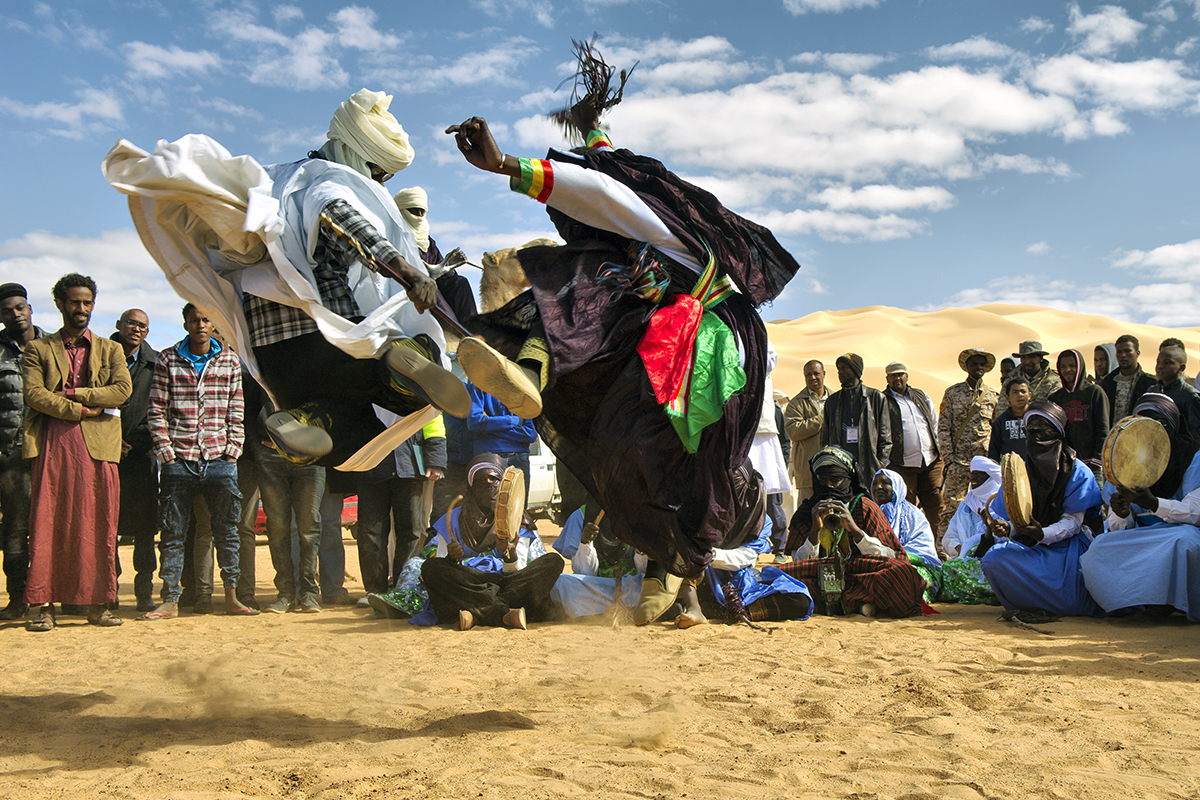International Spotlight: Tuareg Music, Nomadic Soundworlds of the Sahara

Joshua Smith explores the fascinating world of Tuareg music.
Tuareg men are known to sleep with veil’s on, covering their faces all but for their eyes. This is for reasons both ecological (protection from the dry winds of the Sahara) and symbolic (to ward off evil in encounters with strangers). The latter is something the Tuareg people are familiar with. As Nomadic people, they have inhabited a vast area of the Sahara stretching from far southwestern Libya to southern Algeria, Niger, Mali and Burkina Faso as pastoralists involved in Saharan trade since at least the 8th century, though no one can say for sure where they originally came from.
Their distribution placed them in the midst of French colonial regimes in the 20th century, experiencing, and participating in, wars and rebellions against the French and then the newly independent countries in post-colonial times. The latter was down to Tuareg lands being divided between the aforementioned nations, making them a minority across multiple nations and depriving them of any official territory. Uprisings ensued against the newly formed governments, most notably the uprisings by various Tuareg groups in Niger and Mali between the years 1990-95 led by the legendary freedom fighter Mano Dayak. The aim was to achieve autonomy and form their own nation state. This has never materialised, either via rebellion or diplomatic efforts, but the spirit of rebellion lives on in their culture, and music.
the spirit of rebellion lives on in their culture, and music.
As a fiercely independent people, it isn’t a surprise that they should have a rich, free-spirited musical tradition stretching back many centuries. Traditionally, two instruments form the bedrock of Tuareg music, the tindé drum, and a one stringed fiddle called an Imzad. Tindé and Imzad performances are legend and formed the basis of the Berber musical output until the late 1970’s when the band Tinariwen swapped their traditional instruments for guitars.
What followed was a kaleidoscopic sound filled with atmospheric, undulating rhythms combining tradition with the ecstasy of their influences such as Van Halen. Their founder and leader Ibrahim Ag Alhabib, credited with inventing the modern rock version of Tamasheq music or ‘desert blues’, engineers a sound which recalls the hazy expanse of the land it was created in. Hypnotic, bubbling soundworld’s that ascend into an expanse of unexpected bliss meet the ear and whisk one away into the glorious world of modern Tuareg music.
Tinariwen became the pied pipers of revolt
Graced with revolutionary fervour from concept to lyrics, the music of Tinariwen was first developed in military training camps set up by Colonel Ghaddafi. During the subsequent rebellion Tinariwen became the pied pipers of revolt, galvanising youth who otherwise lived clandestino lives in Libya and Algeria.
The ‘desert blues’ tradition started by Tinariwen has been inspiring artists since their formation, most notably the singers and guitarists Abdallah Ag Oumbadougou and Mdou Moctar who both carry on a tradition of blending heritage with modernity to create truly unique sounds. Mdou Moctar’s most recent full bloomed masterpiece of energy and emotion, Afrique Victime, is decorated by a soaring magpie holding the African continent, framed in the southern hemisphere by a face with a tear falling from their eye. Moctar, while influenced by Hendrix and Prince, transcends all traditional musical structures, perpetually reinventing the possibilities of guitar music with chants of social critique and touching emotionality in an ordered chaos of passion.
There is a freedom to Moctar’s music which flutters into the ether like a butterfly carrying a firework. Gaining momentum on the desert blues tradition of Tinariwen, the real magic ignites when he starts soloing at a pace that would produce a smirk of admiration from Jimi Hendrix. Finding professional recording studios “much too square”, he would much rather record his music out in the open of the desert, which is its ideal setting, the vast expanse of the desert the only place providing enough space for the music to run at full pace.
Hailing from Niger and singing in the Tuareg dialect of Tamasheq, Moctar uses his music to celebrate his heritage and protest against the brutality of the times when that heritage was held hostage under French colonial rule. Therefore, beneath the joy of the ethereal guitar solos, there is a melancholy.
the only instruments used consistently throughout its history is a revolutionary spirit and the freedom provided by the Sahara.
As well as the tumultuous history of the Tuareg’s fight for freedom, Moctar frequently speaks of the recent atrocities in Niger and his focus on building wells throughout local villages while supporting other aid appeals. From this we can infer that he is not only chanting about what his culture was and is, but what it could become of it in the future “if we stay silent”.
Tuareg music has never been held back by cliché because it has never had a cliché to follow; the only instruments used consistently throughout its history is a revolutionary spirit and the freedom provided by the Sahara. Despite the instability of North African governments, Tuareg music continues to flourish, with Tuareg musicians becoming international nomads, bringing joy through their intoxicating and urgent musical traditions the world over.


